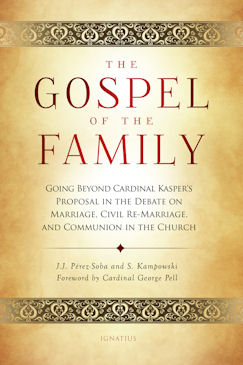
|
Posted December 4, 2014
Book: The Gospel of the Family: Going Beyond Cardinal Kasper's Proposal in the Debate on Marriage: Civil Re-Marriage, and Communion in the Church Authors: Jose Perez-Soba and Stephan Kampowski Ignatius Press. San Francisco, CA. 2014. Pp. 255 An Excerpt from the Jacket:
Walther Cardinal Kasper created an international media stir when he proposed allowing divorced and civilly remarried Catholics to receive the Eucharist after a penitential period. But is this something the Church can even authorize? As the Church enters into the Extraordinary Synod of Bishops on Marriage and the Family, this book takes up the Kasper proposal and sorts the helpful from the problematic. Never separating pastoral concerns from doctrinal considerations, the authors engage Cardinal Kasper's ideas with respect, but also at times with some profound disagreement. How can we heal the wounds of a broken culture? How do we best support families, given the challenges of modern life? What is truly merciful? If the family is central to both society and the Church, how do we best express the truth of its importance? As the authors delve into the matter, they discuss how the early Church addressed issues of marriage and separation, and review the history of Church practice and discipline on marriage. They also explore how contemporary moral attitudes have shaped modern perceptions of marriage and divorce, and how the Church can offer pastoral guidance in this area. An Excerpt from the Book: Why is romantic love incompatible with marriage? Romantic love originated as a cultural response to a type of rationalism that ignored the affections, and it is no accident that it appears to be an irrational emotional explosion. According to the romantic understanding, love is something purely spontaneous, detached from any obligation, and its authenticity is measured solely by the standard of its intensity. When these conditions are present, time becomes the enemy of love, because it consumes it from within and pursues it until it puts an end to it. Finally, romantic love overvalues intimacy, and it is limited to the perimeter that surrounds the couple and stubbornly resists any outside help. Marriage as an institution and a social reality therefore becomes the enemy of love because it locks it into obligations formulated in positive legal norms. Christianity, in contrast, believes that love is an act of freedom that concerns the whole person, and that the truth thereof resides in the good that it promises, and not in the intensity with which it is felt. This is why the formula of consent to marry is a promise. The matrimonial bond, consequently, arises from the exchange of promises pronounced in the presence of a higher authority, before God himself. For this reason, time helps couples to understand that the source of the love of husband and wife is found in a greater Love that surpasses them, and this Love is what gives them the solid rock on which to build a steady relationship supported by the divine gift. Table of Contents: Forword by George Cardinal Pell 1. Announcing the Gospel of the Family in a sex-saturated culture 2. The truth of sacramental marriage: where mercy and faithfulness meet 3. The experience of the primitive Church: faithfulness to the Gospel of the Family 4. A life given in time: rebuilding the moral subject 5. A pastoral ministry of mercy: living the truth in charity Conclusion: A Gospel, rather than a problem Appendix: Thirty key questions for the synods on the family |
|
